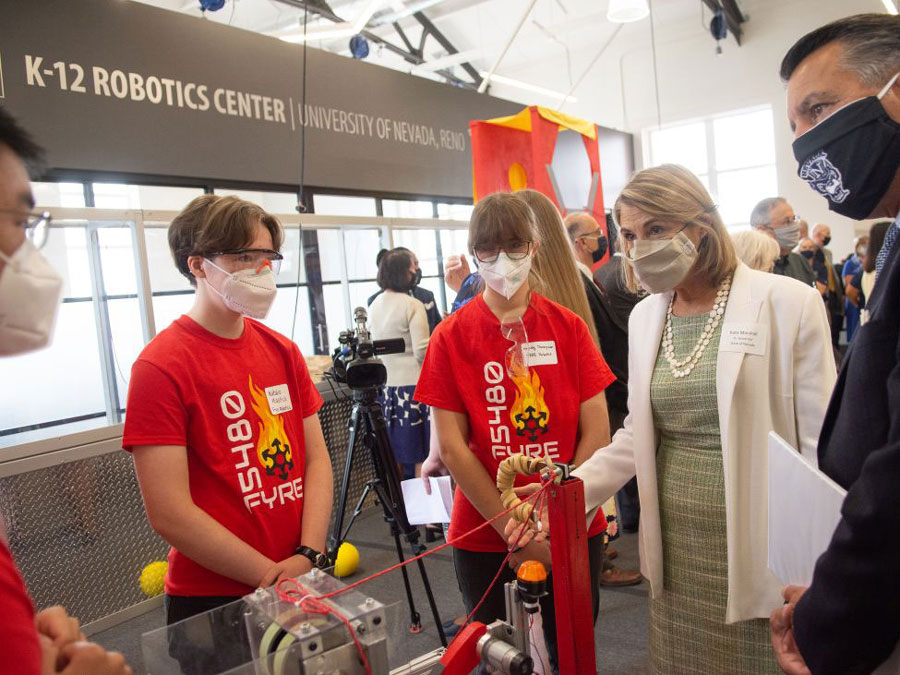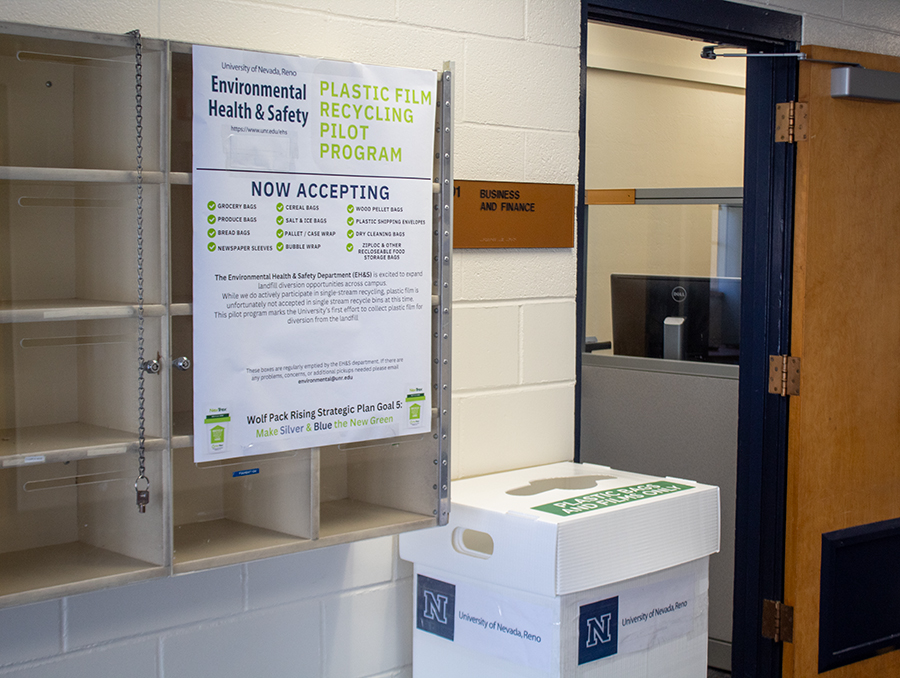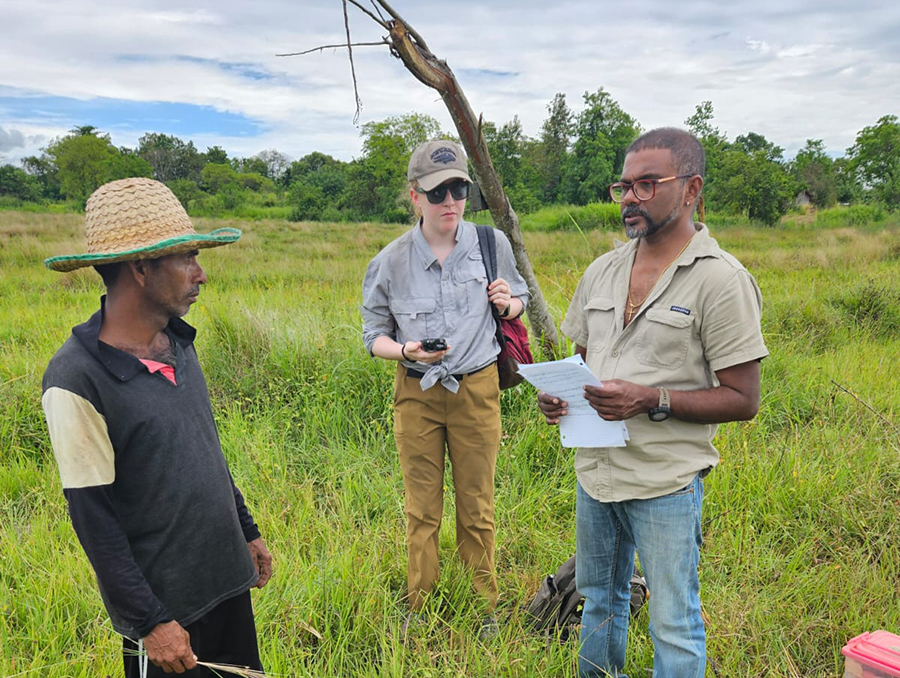A vision to create a unique space that encourages young people’s interest in robotics, computer science, engineering and automation – and strengthen the pathways to degrees and careers – is now reality. The K-12 Robotics Center|University of Nevada, Reno, supported by Tesla and the Economic Development Authority of Western Nevada (EDAWN), celebrated its opening in downtown Reno on August 6, 2021.
K-12 robotics competitions stimulate interest and development in these critical fields of study, and competition teams need specialized equipment and large, open areas as they design, build and test their creations. The K-12 Robotics Center provides the necessary tools and space.
“It will be a place where kids and parents, coaches, teachers and University faculty, all come together,” said Mridul Gautam, the University’s vice president for research and innovation and professor of mechanical engineering. “The kids will learn to design and build, and they will see the opportunities and the support for their future success.”
Chris Reilly, Tesla’s director of recruiting & workforce development, is confident the K-12 Robotics Center – and other efforts to encourage robotics-based curriculum and activities happening across the state – will lead more students toward careers in advanced manufacturing and engineering fields. Many Tesla employees tell Reilly that it was involvement in high-school robotics competitions that sparked their interest in these future-oriented career possibilities.
“Robotics competitions encourage creativity, innovation and fun, but make no mistake about it, these competitions and the K-12 Robotics Center are about something just as important – creating pathways to skills, degrees and careers,” said University President Brian Sandoval.
Educational innovation
Mike Kazmierski, EDAWN president and CEO, sees the K-12 Robotics Center helping to answer a big question: “Where are we going to be as a region in 10 years? If we are going to be a tech hub, we need to reinvent how we think about and teach technology.”
EDAWN has added the position of regional robotics coordinator to its team to support programming and connect the region’s robotics-related efforts, educators and organizations. In this role, Caroline Hanson is coordinating with the team at the University’s Innevation Center, which oversees activities in the K-12 Robotics Center.
Dale Payne, robotics program coordinator with the Washoe County School District, reports that already almost all Washoe County high schools have some robotics-based curriculum or programming in place.
Reilly envisions a day when all high schools in Nevada offer curriculum and programs in robotics, putting a larger number of students on the path toward careers in robotics and automation. “Having dedicated spaces in our community centers and at our schools will help accelerate this,” he said.
“We are especially interested in encouraging underrepresented and first-generation students to be part of this,” Gautam said.
Life-changing
When Rachel Salas, director of the University’s Center for Learning and Literacy in the College of Education & Human Development, participated in the First LEGO League program with her daughter many years ago, she observed how the program helps children gain confidence in themselves and their abilities. By building robots with LEGO pieces, participants learned STEM, robotics and language concepts without realizing it.
“This was an activity where they got to come and shine and excel, and I still see it today,” she said.
Salas began the Center’s First LEGO League robotics program in 2017. Today, she and University-student-mentors coach the Wolf Pack Bots. Comprised of students in grades 3-6, the team prepares for competition in the University’s Innevation Center.
“This program is worth it. We’ll keep this going no matter what,” Salas said.
FYRE Robotics, a community-based team with members in grades 6-12, also prepares for the FIRST Robotics Competition (For Inspiration & Recognition of Science & Technology) in the University’s Innevation Center and utilizes the specialized equipment in its Makerspace.
“It really changes a kid’s life, and it has nothing to do with the robot the kids build or whether or not it works. It has to do with what they learn and what they can accomplish,” said Kerry Thompson, primary organizer of and mentor to the FYRE Robotics team.
“At the University, our student population is reflective of the state we serve; increasingly diverse, increasingly first-generation, increasingly eager to enter the world of discovery and technology,” said University President Brian Sandoval. “We need our students – at all levels of our educational systems and from all backgrounds – to see and understand the opportunities ahead.”
Connecting the past and future
The K-12 Robotics Center is in the historic Southside Studio, formerly the Southside School, at the corner of Liberty and Sinclair Streets, across the street from the University’s Innevation Center. Operated by the University since 2019, the Southside Studio is home to Sierra Nevada Journeys, a science-education nonprofit organization serving Nevada and California. The Southside Studio also helps meet the demand for work-space available to early-stage entrepreneurial companies engaged with the Innevation Center.
The Southside Studio’s upstairs space, once the former school’s combined gymnasium and performance stage, is home to the K-12 Robotics Center, thus blending the past with the future.
Recently completed remodeling of the Southside Studio, supported by Tesla, addressed ADA accessibility and added a new HVAC system, a competition practice area and a new Woodshop that complements the Innevation Center’s Makerspace.
Gautam talks often about the energy of the University’s Innevation Center. He sees the Southside Studio, and the K-12 Robotics Center within it, as expanding the Innevation Center’s impact and the University’s footprint.
“It is so exciting to see this project come together,” he said.
More information about the K-12 Robotics Center is available at unr.edu/innevation/k12-robotics-center. For volunteers, organizations or businesses wanting to be involved, email Hanson at hanson@edawn.org.















